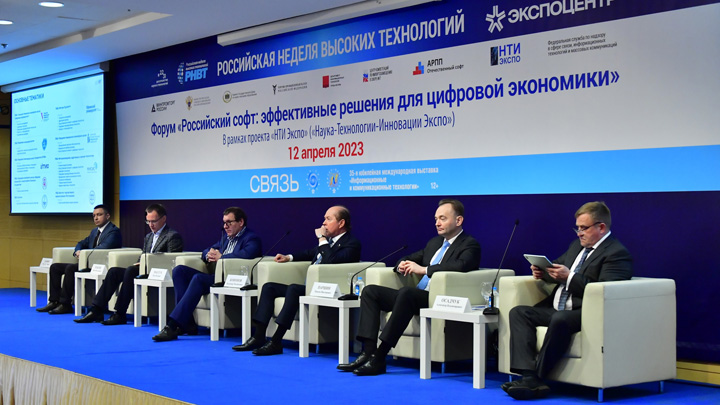Russian Software Forum took place at EXPOCENTRE
The meetings of the Russian Software Forum on Effective Solutions for the Digital Economy were held as part of the Sviaz 2023 exhibition at EXPOCENTRE Fairgrounds.
The organisers of the Forum’s plenary session dedicated to information technologies and formation of technological sovereignty of Russia in this area, were the Russian Ministry of Digital Development, Communications and Mass Media, the Russian Ministry of Defense, the Russian State Duma Committee on Science and Higher Education, and EXPOCENTRE AO.
The plenary session was moderated by Vladimir Kononov, Deputy Chair at the Russian State Duma, Chair at the Organising Committee of NTI Expo.
Russian Deputy Minister of Digital Development, Communications and Mass Media Maxim Parshin shared with the session participants some of the results of the work of the Russian Ministry of Digital Development, Communications and Mass Media in the field of import substitution and ensuring technological sovereignty of the country. He noted that, “The Russian IT industry feels much more confident than many other industries. Russia is one of the three countries where there are solutions for almost the entire line of software products of all software classes. And these solutions have emerged in open and fair competition with global players in the domestic market.”
According to the speaker, already in the autumn of 2022, Russia completed the formation of the IT landscape of the national economy. As a result, a detailed picture of the use of non-Russian and Russian IT solutions in domestic enterprises was obtained, the “maturity level” of own software products available in the market and their ability to replace imported software was determined.
Creation of the IT landscape made it possible to compile in the sphere of domestic software a list of priority projects that are currently demanded by customers inside the country and need investments to finalise them. Accordingly, the state was able to pursue a targeted institutional policy to support its own software product developers and support with resources their readiness to move forward in the first stage towards import substitution, while simultaneously solving the tasks of bringing the national IT industry to the frontier of proactive import substitution.
Continuing the theme of technological development institutes, Ilya Massukh, Director of the ICT Competence Centre, made a presentation on advanced engineering schools in Russia, which have been and remain leading centres of technological growth and training of qualified engineering personnel for all sectors of the national economy without exception. “Without knowledge, without creating a base,” the speaker noted, “it is impossible to achieve technological sovereignty. The task is to create such a base for the country’s development for the next 20-30 years.”
Head at the Main Directorate for Innovative Development of the Russian Ministry of Defense, Major General Alexander Osadchuk dwelled in his report on the topic of dual-use technologies. In particular, he said, “Historically, military science is a driver of technology development. We can see it now. IT solutions, artificial intelligence technologies, and drones are used. And this is just the tip of an iceberg. New solutions are constantly formed, new technologies, and new designs are developed.”
The speaker noted, “one of the trends is initiative development of new technologies, which is carried out at the developers’ own expense”. As a rule, such projects are more dynamic and, according to Alexander Osadchuk, “it is important to maximise the number of teams involved in the development, to find these teams, to find those very Kulibins (Kulibin was a Russian mechanic and inventor) who can offer new solutions.”
The participants in the plenary session on Information Technologies and Formation of Technological Sovereignty touched on other essential aspects of this important task continuing the discussion already at the next thematic session on Russian Platform Solutions. Horizontal, Vertical and Backward Compatibility.
Preceding the discussion, its host Ilya Massukh stated, "What we’re dealing with: there are many IT solutions, and almost every niche has a Russian analogue, or even two or three. But the IT world has been developing for 30 years according to the principle that different software products are compatible with each other. Our task is to build an ecosystem in which different Russian products would be compatible with each other in terms of data, interaction, and hardware platforms. Then a strong foundation for technological sovereignty will be formed.
The topic of platform solutions was discussed by, Vice President of Information Systems Development of Rostelecom Dariy Khalitov, Head of Regional Sales at Grinatom Simple Solutions Dmitry Donskoy, Head of the Committee for Integration of Russian Software at Russian Software Products Association “Russian Software”, Deputy Director General at Postgres Professional Ivan Panchenko, Chair of the Board of Directors of BaseALT Andrey Smirnov, and representatives of other leading domestic software development companies.
The working day of the Forum on Russian Software: Effective Solutions for Digital Economy ended with the thematic session on Dual-use Technologies and Russia’s Technological Sovereignty, where Vasily Elistratov, Doctor of Technical Sciences, Head of Department for Artificial Intelligence Technology Development of the Ministry of Defense, spoke.
Press Service, EXPOCENTRE AO

